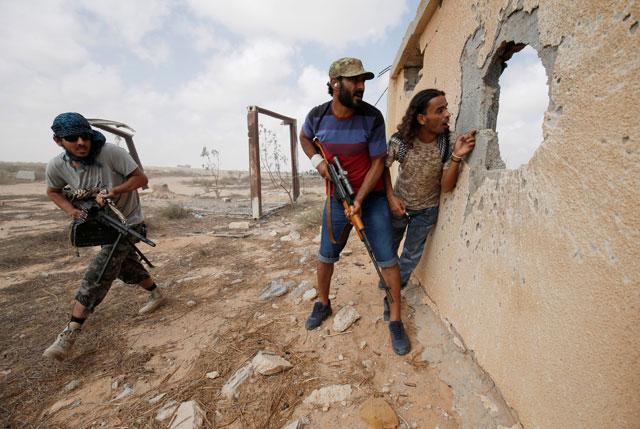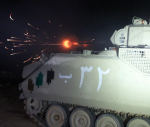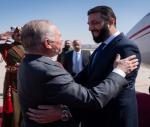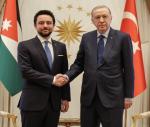You are here
Signs grow of new Western urgency to stop Daesh in Libya
By Reuters - Feb 25,2016 - Last updated at Feb 25,2016
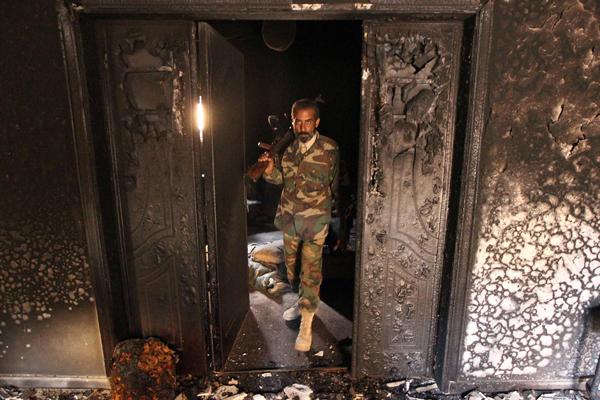
A fighter loyal to Libya's internationally recognised government checks a damaged house in Benghazi after government forces seized the centre of the eastern coastal city on Tuesday, following a string of gains against militias including the Daesh terror group (AFP photo)
WADI BEY, Libya — An hour's drive from the Libyan city of Sirte, a few dozen troops man outposts along a desert road. They are hoping the West will soon be giving them more help to fight a common enemy: Daesh.
Armed with little more than gun-mounted pick-up trucks, they are a last line of defence against the extremist group which controls swathes of Syria and Iraq, and which has now taken advantage of chaos in the north African state to seize territory there. Sirte is its stronghold.
"They're getting stronger because no one is fighting them," said Misrata forces commander Mahmoud Gazwan at the Wadi Bey checkpoint, a dusty outpost serving as a mobile base for his brigade of fighters.
There are signs of a growing Western urgency to stop Daesh, and Libyan commanders say Western weapons and air strikes will make a vital difference in the coming battle against their better-armed enemy.
But Western officials say just as important is the need for a united Libya government to request more aid and for the Libyan forces ranged against Daesh to bridge their own deep divisions.
Five years after Muammar Qadhafi's overthrow and death, Libya is caught in a slow-burn civil war between two rival governments, one in Tripoli and one in the east. Each is backed by competing alliances of former rebel brigades whose loyalties are often more to tribe, region or local commander.
Forces from the port city of Misrata — one of the most powerful military factions — have been on the front line of the battle against Daesh since it took over Sirte a year ago and drew more foreign fighters to its ranks there.
Daesh militants are also fighting in Benghazi to the east, shelling the oil ports of Ras Lanuf and Es Sider. On Tuesday they attacked further west in Sabratha city.
US special forces have been holding meetings with potential Libyan allies. US and French drones, and British RAF jets are flying reconnaissance missions in preparation for action to help the local forces fighting Daesh.
An air raid by US special forces on Sabratha killed more than 40 Daesh militants last week, but there are no international plans to send combat ground troops into Libya.
Western governments are wary of large-scale military intervention but fear inaction may allow Daesh to take deeper root.
A US government source said the Obama Administration was pursuing a two-track policy. One is to try to knit competing factions into an effective government. The other track involves air strikes.
"When you see an ISIL [Daesh] training camp, and we see them doing push-ups and calisthenics every day, they're not there to lose weight," Brett McGurk, the US envoy to the international coalition fighting Daesh, told White House reporters.
"They're there to train for something, and we're not going to let them do that."
Convergence of forces?
US and European officials say infighting between the rival administrations is blocking UN efforts to cajole them into a national government capable of rebuilding Libya's army.
Tripoli is held by a faction of Islamist-leaning brigades, and Misrata fighters who took over the city in 2014 and drove out rivals. Misrata now backs the UN deal while some of the Tripoli political leadership is against it.
Libya's eastern government is backed by an alliance including the Libyan National Army led by former Qadhafi ally-turned rebel Gen. Khalifa Haftar, and a brigade controlling oil ports. Its ranks are split, including federalists looking for more autonomy for their eastern region.
The United Nations-backed presidential council is waiting for approval of its new government from the elected House of Representatives in the east.
Frustration is growing in Western capitals after repeated failures of the House to vote or reach a quorum to hold a ballot on the new government.
"We have always made clear the intention of providing assistance in fighting Daesh. We need to take action where we can, that requires forces on the ground that we can help and train," said one Western diplomat.
"Patience is very short with the House of Representatives."
Italy said on Monday it would let US armed drones take off from its soil to defend US-led forces against Daesh.
French special forces and intelligence commandos are engaged in covert operations against Daesh in Libya in conjunction with the United States and Britain, the French newspaper Le Monde reported on Wednesday. The French defence ministry declined to comment.
During the recent fighting in Sabratha, there were signs of cooperation among forces from Zintan and Sabratha brigades who back opposing sides in the wider national conflict.
Mattia Toaldo, a Libya expert with the European Council on Foreign Relations, sees a convergence of forces who may agree on little but can work together against Daesh.
Misratan forces backed the new UN-supported government and could potentially work with rivals from Haftar's Libyan National Army and the oil guards, who are both aligned with the eastern government, Toaldo said.
"We are confident here we can win," says Mohamed Al Oreifi, one of the outpost commanders near the Sirte front line. "But we need support and new weapons."
Related Articles
TUNIS — While US jets and drones are pounding the Daesh terror group in the Libyan city of Sirte, Western powers are unlikely to expand thei
SIRTE — When Western officials cajoled Libya’s warring factions to support a unity government this year, they said it was a chance for the r
SIRTE, Libya — Libyan forces backed by US air strikes have finished clearing the final district of the former Daesh stronghold of Sirte in w


